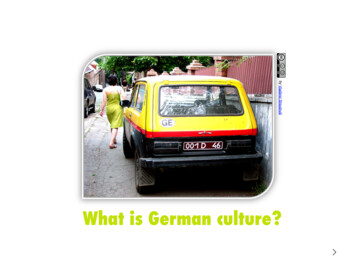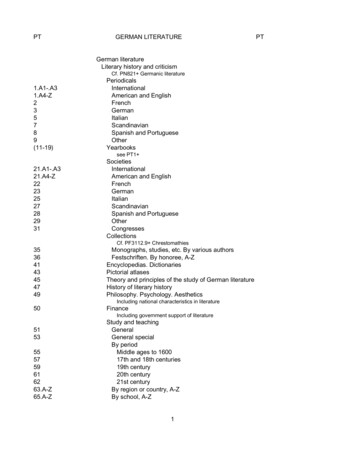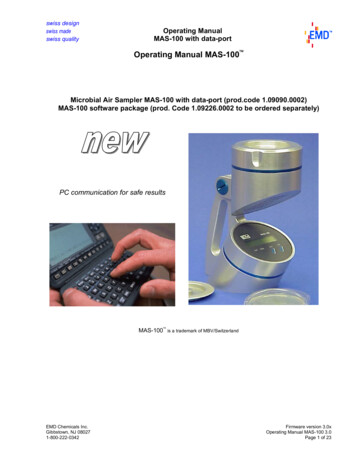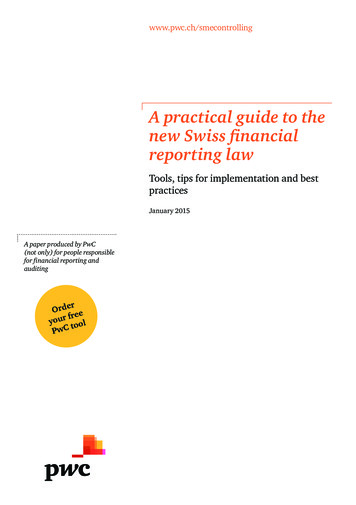
Transcription
SIMON & SCHUSTER’SPIMSLEUR SWISS GERMANreading booklet
Travelers should always check with theirnation's State Department for currentadvisories on local conditions beforetraveling abroad.Graphic Design: Maia Kennedy and ‰ Recorded Program 1995, 1999, 2006 Simon & Schuster, Inc. Reading Booklet 1995, 1999, 2006 Simon & Schuster, Inc.Pimsleur is an imprint of Simon & Schuster Audio,a division of Simon & Schuster, Inc. Mfg. in USA.All rights reserved.
acknowledgmentsSwiss GermanVoicesEnglish-Speaking Instructor . . . . . . . . Jordan WeinsteinFemale Swiss German Speaker. . . . . . . Ursula R. GodwinMale Swiss German Speaker . . . . . . . . . . . . . Mark GrafCourse WritersLieselotte Anderson, M.A., M. Ed. Elisabeth HeinrichEditorBeverly D. Heinleiii
table of contentsReading LessonsSpeakers of Swiss German . . . . . . . . . . . . . . . . . 1Why Learn Swiss German? . . . . . . . . . . . . . . . . . 4Courtesies to Remember . . . . . . . . . . . . . . . . . . . 6Beginning a Conversation . . . . . . . . . . . . . . . . . . 8Getting Around Swiss German Towns . . . . . . . . 9Swiss German People . . . . . . . . . . . . . . . . . . . . 10Extending a Personal Invitation . . . . . . . . . . . . 11Eating Out in Switzerland . . . . . . . . . . . . . . . . . . 12Swiss Money, Numbers, and Dates . . . . . . . . . . . 14Visiting a Swiss Home . . . . . . . . . . . . . . . . . . . . 15Casual Conversation with Swiss Germans . . . . . 16Websites with Information on Switzerland . . . . . 17v
For more information, call1-800-831-5497 or visit us atwww.Pimsleur.com
swiss germanSpeakers of Swiss GermanAlthough Switzerland is only about half the sizeof Maine, it is a very diverse country. The Swissfederation is composed of 23 “cantons” (states)which function with a large degree of politicalautonomy. Each canton, for instance, has the rightto determine which is to be the official languagewithin its boundaries: German, French, or Italian.The majority of the population, about 65%, speaksGerman. It is spoken in 11 out of 23 cantons.The so-called “German speaking cantons” arethe cantons of Aargau, Appenzell, Basel, Berne,Lucerne, St. Gallen, Schwyz, Thurgau, Unterwalden, Uri, and Zurich.French is the language of 18% of the population, while 10% speak Italian (figures establishedby the Union Bank of Switzerland, 1997). About1%, mainly in the Engadin, speak RhaetoRomanic (Romansch), the fourth national, butnot official, language.The first language of all German-speaking Swissis not the standard German that is the officiallanguage of Germany. It is rather one of themany Swiss German dialects, generally referredto collectively as Swiss German, Schwyzerdütsch.Swiss German is a spoken language only, inherited
swiss germanSpeakers of Swiss German (continued)Switzerland: language areas.GermanFrenchItalianRomanshfrom Alemannic ancestors more than a thousandyears ago. Characteristic of all spoken languages,it preserves a strong feeling of group identity foreach individual, township, and valley. Unlikedialects in some other countries, Swiss Germanis not limited to a particular social class, butconstitutes the spoken language of people in allwalks of life. Lawyers consult in Swiss German,2
swiss germanSpeakers of Swiss German (continued)professors use it in discussions with their students,families converse in it, and many television andradio stations broadcast in Swiss German. EachGerman-speaking canton of Switzerland has itsown distinct pattern of speech; between citiesand rural areas, and even between one mountainvalley and another, people will proudly use theirown traditional variety.The Swiss German language has no writingsystem. In spite of an attempt in recent years toproduce a written Swiss German, so far all writtenmaterials such as newspapers, books, plays,letters, and announcements are written in standardGerman, appropriately also called Schriftdeutsch— “German for Writing”— which is also theofficial language of Germany and Austria. Formany German-speaking Swiss, standard Germanis virtually a foreign language which they learnat school. When the Swiss Germans use it inspeech, it tends to sound rather stiff and stilted.The spoken Swiss German language differssignificantly from standard German in grammar,vocabulary, and pronunciation.3
swiss germanWhy Learn Swiss German?In one sense, English could be called the linguafranca in Switzerland, but most publications, forms,warning signs, etc. are printed in the three officiallanguages and seldom in English. English isn’ttaught as a mandatory subject in Swiss schools andtherefore isn’t as widely spoken as in many northern European countries. However, since Englishis such an important business and commerciallanguage, many people do speak English, andyou will find that almost all Swiss Germans willeagerly practice their English with you. You maynow ask yourself, “So why am I learning SwissGerman?” Well, learning Swiss German will helpyou feel at home in your Swiss surroundings.Although there are substantial differencesbetween the Swiss German dialects, the phrasesyou will learn through this program will allow youto begin to understand the Swiss Germans and tobe understood by them. They will allow you to feelincluded in the daily activities of Swiss life. It is amagic moment when you switch from the role of anobserver to that of a participant insider, whether youare there on business or for leisure. As you developrelationships with Swiss German colleagues,neighbors, and friends, as people recognize you4
swiss germanWhy Learn Swiss German? (continued)and make small talk with you in English, you willinvariably feel the desire to reply with a few cordialwords spoken in Swiss German.As you travel through small towns and moreremote parts of the country where you encounterfewer English speakers, you might need to ask fordirections or order a meal in Swiss German. Onother occasions, you might wish to extend a specialinvitation or reply to your Swiss hosts with a fewwords in Swiss German. Your interest in SwissGerman culture and your willingness to speakthe language will win you the respect and trustof the Swiss German people. If you plan to settlefor a period of time in a German-speaking areaof Switzerland, you will find that Swiss Germanopens doors, both in business and socially.5
swiss germanCourtesies to RememberRemember that there is a humorous and endearingside to the mistakes a language learner makes!When you learn to laugh with your Swiss listenersat your pitfalls, they might become the memoriesof a lifetime. But some essential courtesies areworth knowing about Swiss German life.Swiss Germans take formalities seriously anddisregarding them easily results in feelings ofpersonal insult. Here are five basic rules of conduct: Always shake hands when you greet or takeyour leave of people, even in short encounters,and even if this means reaching out for a dozenhands across the table. This includes children andpeople of all social classes. Greet men with “Herr” and women with“Frau” and with their last names unless you areexplicitly encouraged to use first names with closefriends. Use “Fröilein” only for girls in their lateteens, or for waitresses and hotel maids.6
swiss germanCourtesies to Remember (continued) Knock before entering any room in a home oroffice and wait for the response to enter. Excuseyourself as you step through the doorway. Close thedoor behind you. Open doors mean carelessnessand disorder. Be on time for all social and businessengagements! The Swiss Germans consider beinglate an insult. Not only people, but all forms oftransportation in Switzerland arrive and leave righton time. If you are there on business, bring businesscards. Hand your card to the receptionist andto the person you are meeting, even if you havearranged the appointment in advance. Have yourprofessional degree printed on the card, alongsideyour name. If your company is long established,have the year of its founding printed on your card.The Swiss respect formal education, diplomas,and degrees; and they tend to value continuity andtradition over innovation and change.7
swiss germanBeginning a ConversationTo start a conversation in English, we frequentlyuse the polite greeting, “How are you?” TheSwiss equivalent for “How are you?” is, however,not a rhetorical, but a personal question. It shouldonly be used to start conversations with peopleyou know well. The answer is also personal — astatement about one’s actual well-being.A general and popular conversation starter is totalk about the weather. Since it rains often and forseveral days at a time in northern Switzerland, itnever fails to elicit a response, even from the moststubborn stranger!8
swiss germanGetting Around Swiss German TownsThe center of most towns is the train station andthe market place, and major roads and other publicmeans of transportation all lead to these two destinations. In small towns they are also the center ofpublic activity. Most towns have fruit, vegetable,and flower markets on various days of the week,and major cities have open markets on most daysof the week. And a train station might be theonly place in town where you can buy Englishnewspapers and a snack after hours.The Swiss are justly proud of the fact that theyhave the densest public transportation network inthe world. It allows for easy distance traveling andlocal commuting; many season tickets and specialdiscount tickets are available. Although mostpeople own cars, they are generally luxurious andare more frequently used for leisure transportationrather than for work. In fact, since distances aremuch smaller in Switzerland than in the UnitedStates, and people have become more aware of thenecessity for environmental protection in recentyears, many people even cycle to work.9
swiss germanSwiss German PeopleSwiss Germans are generally proud of theircountry’s internal social and political stability,its neutrality, and its independence in relation tointernational affairs. They are also proud thattheir country is one of the wealthiest countriesin the world, and they try hard to maintain itsbeauty. They appreciate if these achievements arenoticed and mentioned by visitors, but they arereserved, to the point of understatement, in theirown comments.Similarly, Swiss Germans are meticulouslycorrect in their behavior toward each other, althoughthe formalities are subtle and easily misunderstoodby visitors. They present a composed posturetoward other people, which is easily misinterpreted as cold treatment of others. They value hardwork, thrift, and punctuality and expect a highdegree of responsibility, especially in the publicdomain. Cleanliness, neatness, orderliness, and akeen sense of privacy are seen as expressions ofgood citizenship and personal character.The frequent use of polite forms in Swiss Germangreetings and requests can be regarded as a softeningeffect in an otherwise stern social environment.10
swiss germanExtending a Personal InvitationThe Swiss generally are geared to long-termplanning and solutions. Whatever they build, it’smeant to last a long time, if possible forever. It istherefore not astonishing that they are generallysomewhat reluctant to make friends with foreignersand even other Swiss, but once they get to knowyou, they may turn out to be your life-long friends.If you would like to get to know a Swiss personbetter, it’s a good idea to ask that person to goout to a restaurant, cafe, or bar with you. Sincemany Swiss Germans have their day more or lesscompletely planned out, set up the appointmentwell in advance.When you move into a new house in Switzerland,don’t be surprised if you aren’t welcomed byyour neighbors. They are not unfriendly, butrespect your privacy. It’s up to you to introduceyourself and to invite them over for coffee, anddon’t be surprised if their visit is short. Except foroccasional invitations between relatives and veryclose friends, many Swiss Germans prefer to goout together rather than being invited to someone’shouse.11
swiss germanEating Out in SwitzerlandIn Switzerland it’s customary to use greetingswhen entering and leaving a restaurant (as wellas small shops). Contrary to American custom,there are no hosts or hostesses in Swiss restaurantsto seat you. Ordinarily you look for a free tableyourself. In restaurants of the higher price range,however, a waiter or waitress will approach youand suggest a table or lead you to the table thathas been reserved for you. Don’t be surprisedif someone asks for permission to sit at yourtable when there is a shortage of free tables. Bysaying “bitte” you allow him / her to share yourtable. Don’t panic, diners don’t usually strike upconversations, unless you want to practice yourSwiss German!The custom of automatically serving ice wateris not known in Switzerland, and people normallydon’t drink coffee with their warm meals, but afterwards. All Swiss restaurants are obliged by law todisplay their menu and prices outside. Most offera Tagesmenü at lunch time, usually from noon to2:00 PM. Dinner is usually served from 7:00 to9:30 PM. Cafés don’t sell alcohol. Bills include aservice charge of 15%, so the price you see on themenu is the price you have to pay. Although tippinghas officially been abolished, people generally do12
swiss germanEating Out in Switzerland (continued)reward good service. Most people round the billoff to the nearest Swiss franc or more. Large tips,however, are regarded as ostentatious (except bythe recipient, of course). Usually the tip is givendirectly to the waiter or waitress when paying andnot left on the table.The Röschti is a delicious Swiss potato dish thatalso serves to define the whole German-speakingarea of Switzerland, especially as distinguishedfrom the French-speaking area. These two regionsare separated by the so-called “Röschti Trench.”13
swiss germanSwiss Money, Numbers, and DatesSwiss banks and financial institutions areworld renowned for their efficiency and range ofservices, and Zurich is one of the world’s majorfinancial centers. The Swiss unit of currency isthe Swiss franc, which is one of the most stablecurrencies in the world. Usually the Swiss do notpay bills with checks or credit cards, and they usecash more often than in the U.S. (approximately95% of all retail purchases are paid for with realmoney). Most large Swiss businesses, however, doaccept major international credit cards, althoughthey don’t always advertise the fact.Numbers in the thousands are marked off by aspace or a period rather than a comma. Thus, onethousand is written as 1.000 or 1 000. In contrast,the decimal point is written as a comma. Youwould read: Fr. 10,50 and say: zä Franke fufzig.The monetary unit after the decimal mark iscalled Rappe in Swiss German. The Swiss francis divided into 100 Rappe. So the price Fr. -,50would be fufzig Rappe.Dates, too, are written differently: first the day,then the month, and finally the year, with periodsand no commas. For example, 30.12.1995 isDecember 30, 1995.14
swiss germanVisiting a Swiss HomeMany Swiss German people live in a rathernarrow and close network of social relationships.Home life is both a shelter from the stress of theoutside world and an expression of one’s ownstanding. Since privacy is very important to theSwiss, it is a gesture of friendship to be invited toa private Swiss home. You may expect that yourvisit has been carefully prepared. Because everything must be spotless and in perfect order whenthe Swiss entertain a stranger, they generallydon’t like it if someone drops in on them. Theyvalue punctuality, so don’t arrive too late (anddon’t overstay your welcome — the Swiss areearly for work!).If you are invited for dinner or coffee, it iscustomary to bring a small bouquet, a box ofchocolates, or a bottle of wine. If you bringflowers, there should be an odd number and youshould unwrap them before presenting themto your hostess. Remember also that red rosessignify romantic love and chrysanthemums arefor cemeteries!At a small party everybody will greet all acquaintances with a handshake, beginning with thehostess and the host. Children also shake handsand are greeted with sali, hoi, or tschau. If youdon’t know anyone, wait until the host / hostessintroduces you.15
swiss germanCasual Conversation with Swiss GermansThe Swiss Germans are generally rather uncommunicative and tend to meet everything foreignwith a certain reserve. They rarely start a conversation with people they don’t know. In business,expect them to come right to the point, withoutany small talk. At dinner parties, when you haveexhausted the topic of the weather, you maywish to go on to the following: participatory orspectator sports such as skiing, hiking, sailing,soccer, tennis, or bicycle racing; what you likeabout Switzerland; and your travels in general.You should realize that the Swiss (in spite of orbecause of their neutrality?) are generally wellinformed about world politics and love to discussit. Remember also that the Swiss are passionate intheir opinions about military service. Discussingit could lead to a major argument.If you would like to get more tips about howto integrate into Swiss German life, you canparticipate in orientations for newcomers, run bythe American Woman’s Clubs. These clubs arelocated in Basel, Berne, and Zurich. Their orientation courses are open to both men and women.16
swiss germanWebsites with Information on SwitzerlandSwiss National Library SNL - Questions aboutSwitzerland - stungen/swissinfodesk/index.html?lang enThe Source for Parents for Information onSwitzerlandhttp://www.thestork.ch/Information about tion about Switzerland, the Swiss, theCulture and much morewww.traveling.chInformation on Living in Switzerlandwww.isyours.com17
The first language of all German-speaking Swiss is not the standard German that is the official language of Germany. It is rather one of the many Swiss German dialects, generally referred to collectively as Swiss German, Schwyzerdütsch. Swiss German is a spoken language










